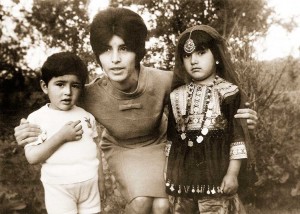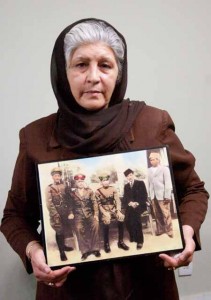Archive for January, 2011
Tajwar Kakar part 2 Life under the Communists
Friday, January 21st, 2011
 My mother engaged me when I was 12, I was married at 14 and had my first child at 15. My husband was Uzbek (which means that he spoke Uzbek as a first language and he had many customs I wasn’t used to. I was his second wife. He was a very powerful man and was always having guests over. So, every other night I had to prepare large dinners for them as well as keep up with my school work (I was in 8th grade when I married) and take care of my children. I never had any help, I did all the work myself.
My mother engaged me when I was 12, I was married at 14 and had my first child at 15. My husband was Uzbek (which means that he spoke Uzbek as a first language and he had many customs I wasn’t used to. I was his second wife. He was a very powerful man and was always having guests over. So, every other night I had to prepare large dinners for them as well as keep up with my school work (I was in 8th grade when I married) and take care of my children. I never had any help, I did all the work myself.
Before the government changed, I had a normal life, a happy life. I finished my schooling and taught for 5 years in Kunduz high school. And after that I became headmaster. But when the government changed. and the king’s cousin, Daoud came into power the Communists began trying to register people. All of my husband’s family became members of the communist party. They especially wanted me to join because my father had been so powerful and so popular, But I rejected it. And so, I was the first woman who got fired from her job. For 3 months I stayed home but eventually they assigned me to another school and watched me very closely so that I couldn‘t contact my friends.
After a year, they sent me to Kabul and every subsequent year they sent me to a different school and gave me different subjects to teach. Every week they came into my classroom and pushed me to join the Communist party. They promised to give me a good position. They offered to send me to Russia or Poland to get my Master’s degree, but I refused it all, knowing that I would be forced to become Communist. They send me from school to school so I wouldn’t have a chance to make friends. But that was a good chance for me. I found a lot of my friends and my teachers and old students. During these 4 years they were arresting people twice a month . They arrested me in 1980. At that time, my oldest child was 14 and my youngest was 5.
In early 1980, whenever the Communists saw any young men they conscripted them and sent them to war. At one point they had arrested 150 men and asked each of them who was working for the freedom fighter women and they gave my name. Three people were witnesses saying that I was the head of women freedom fighters in Kabul. At first they put me in a KBG jail to do an “inquiry”. There I was tortured with electic shock. A lot of people died there. After a month they put me in another jail for a year. The whole time I refused to give any names or information and after a year I was released.
When they let me go, they made me sign a letter saying that if they find that I have any connection with freedom fighters, they will kill me. I signed that paper. When I got out they sent me back to Kunduz and I found that they had punished my children in a different way by telling them bad things about me. At the same time, the Afghan Communists were attacking villages, people’s houses, raping their women and killing their husbands and their children. So I became the freedom fighter leader in that city.
So, they sent me back to Kunduz and I found that they had punished my children in a different way by telling them bad things about me. At the same time, the Afghan Communists were attacking villages, people’s houses, raping their women and killing their husbands and their children. So I became the freedom fighter leader in that city.
Posted in Afghan Women's Project, Other, Peggy Kelsey, Tajwar Kakar, women | Comments Off on Tajwar Kakar part 2 Life under the Communists
Tajwar Kakar Part 1, Birth Story plus 2011 Update
Sunday, January 9th, 2011
I’ll begin 2011 with the amazing birth story of Tajwar Kakar, a woman I met on my trip in 2003 and again this past spring. I’d love to see her life portrayed on the big screen.
Tajwar Part 1 Birth Story
In 1948, Tajwar’s soon-to-be father was commissioner of the border between the Soviet Union and Afghanistan. The Russians* had gotten control of the Amu Darya River, also known as the Oxus, which runs along the northern side of Afghanistan, and were trying to make the border on the Afghan side of the river. “My father didn’t let them,” Tajwar told me. Six times before, Afghans had tried to negotiate a mid-river border, but had failed. “My father was brought from his post in Farah Province to meet with King Zahir Shah and head up the delegation. Before he left, my grandmother told him that my mother was pregnant. He told my mother that it doesn’t matter whether this child is a girl or a boy, but ‘if I get the river from Russia then it will be a lucky child for me. If I lose this river and Russia makes the border inside Afghanistan, this will be an unlucky child and I never want to see its face.'”
“So every time my grandmother prayed she would say ‘Allah, please help that man. This is an innocent child. When he says he will do this he will because he‘s a very strong Pashtun.’ My grandmother prayed every day that my father would get the river back. On the same day I was born he won back the river.”
“When he got the river he called to his people and told them to bring my child to the border. My grandmother said that I was too young but some people came and made a basket from branches and some very nice cloth. I was put inside and they took off for the border. More than 5000 people followed. When I arrived, my father put me in the boat and we went out into the river where he gave me the name Tajwar which means crown.”
“When he got back to Kabul, my father warned the king about Russia’s intention to invade Afghanistan and of his cousin, Daoud’s intention to help bring it about. Mr. Kakar was ignored, but his sympathies became known within the palace.”
“We moved to Kunduz when I was nine. Two years later, my father was poisoned by Daoud’s people because he was a powerful man and he didn’t support the Russians.”
*Tajwar always referred to the Soviets as Russians, but there were many Soviet troops from Kazakhstan as well as the other satellite states in addition to the Russians.
UPDATE
It’s been months since I’ve updated my blog. But with a new year comes a new determination to be more present in this space. 2010 brought my second Afghan Women’s Project trip to Afghanistan and its subsequent six months of interview transcription and image processing. Finally, my new presentation, Afghanistan 2010, a View from the Ground was crafted and debuted.
2011 will be the year of writing my book on the subject as well as giving presentations throughout the country. In addition to commentary on issues, I will be posting here in this blog elements from the book plus reviews of books pertaining to Afghanistan that I’ve read. And I resolve to post more regularly.
Posted in Afghan Women's Project, AWP 2010, education, Other, Peggy Kelsey, Tajwar Kakar, Uncategorized, women | Comments Off on Tajwar Kakar Part 1, Birth Story plus 2011 Update
